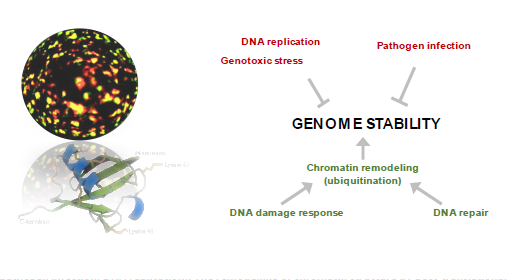Research Group Lorenza Penengo
Keywords
Chromatin modifications, ubiquitin-based signalling, DNA damage response, replication stress, genome stability
Summary & Mission statement
Ubiquitin conjugation is a widely-used protein modification that regulates many cellular pathways relevant for cancer cell proliferation and genome integrity. The ubiquitin system entails several enzymatic – and therefore “druggable” – activities that drive ubiquitination to specific proteins. Targeting specific ubiquitinating enzymes that modulate cancer-relevant pathways is thus an intensively explored strategy for next generation anticancer therapies. As various approved anticancer drugs interfere with DNA damage response and DNA replication, inactivation of regulatory ubiquitin modifications in the stress response is a promising strategy to potentiate chemotherapy. Our goal is to expand the mechanistic understanding of the ubiquitin-mediated control of the DNA damage response and DNA replication processes when cells are challenged by harmful conditions, such as genotoxic stress, inflammation, pathogen infection.
Overview
Ubiquitination of chromatin and chromatin-associated factors is a key step to activate the DNA repair pathways triggered by DNA damage and to promote accurate DNA replication, thereby ensuring genome stability. We are interested in further elucidating the molecular basis underlying the DNA repair pathway choice between homologous recombination (HR), mediated by BRCA1, and non-homologous end-joining (NHEJ), mediated by 53BP1, and how these events impact on genome integrity. Moreover, we aim to understand how these mechanisms regulating genome integrity are modulated in specific cellular contexts – i.e. inflammation – thereby providing additional insights into inflammation-induced cancer development.
Publications
